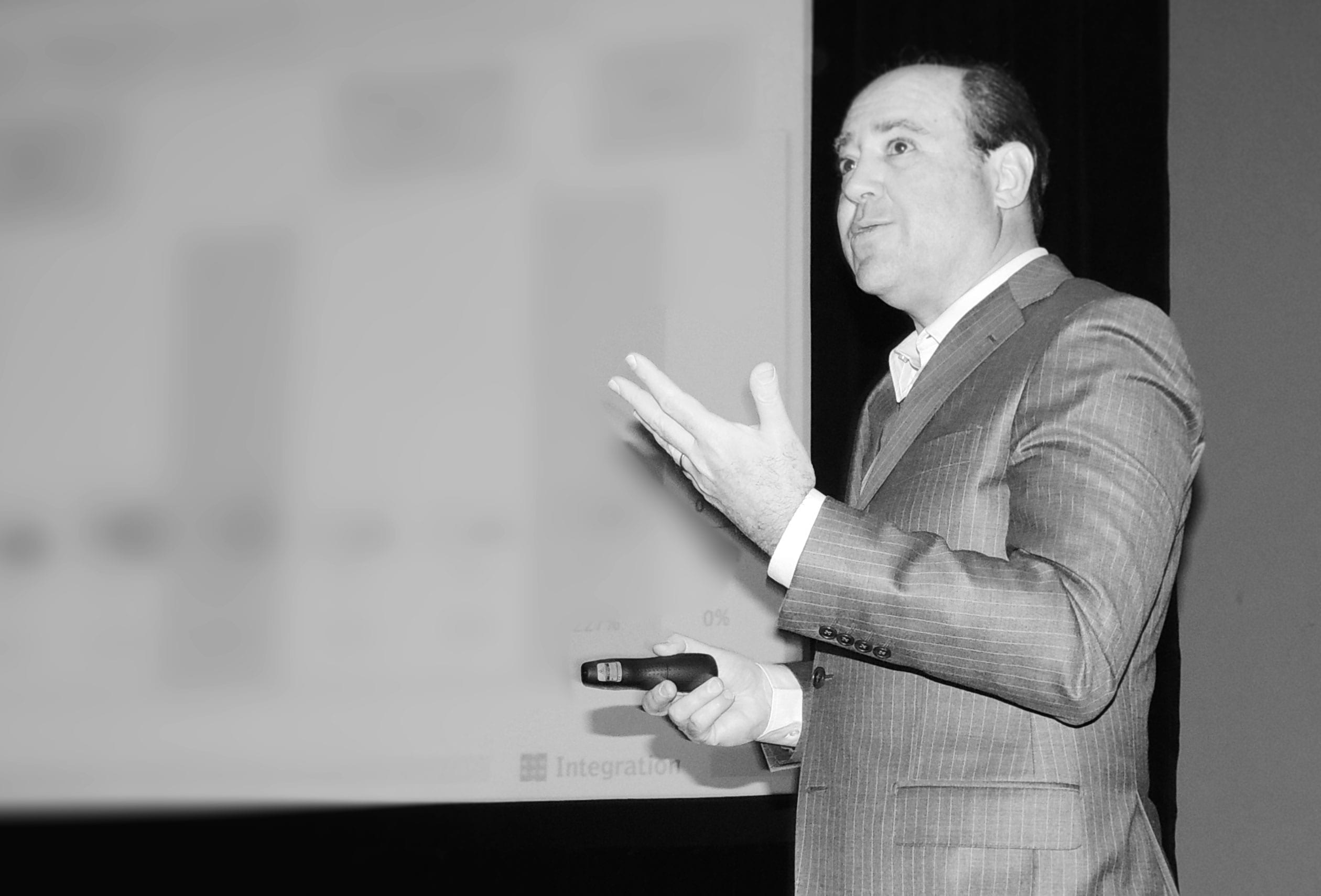Our purpose
Sustainability is key to business success.
Our Sustainability Competence Center supports companies transition to a business model that is equipped for the future, through creating profitable, growth-based strategies that have zero, or even a positive impact in terms of environmental and social footprints along a company’s value chain.
What challenges do we help our clients overcome?
Pressures versus Opportunities: Sustainability is a catalyst for progress
PRESSURES
Sustainability issues are disrupting the business world and are fundamentally changing how businesses operate. Organizations are at the center of this disruption, as they suffer from the consequences and are core to driving the solution.
- Businesses depend on natural resources to operate – from soil, water, and nutrients to metals and clean air. Increasing pressure is being applied to these resources, which is affecting future availability, and impacting operations directly.
- Stakeholder pressure is increasing in every industry – consumers are demanding greener products, investors are divesting companies with unsustainable practices, different societal groups are ‘shaming’ the biggest polluters and uncovering human rights issues, younger generations no longer want to work for unsustainable companies, and new regulations and legislation are being put in place. All of these shifts are requiring businesses to react and adjust the way they operate to remain profitable.
OPPORTUNITIES
Too often only the risk side is emphasized – but sustainability should be seen as a vehicle to create new business opportunities.
- It should act as a catalyst to inspire innovation, offer new consumer experiences, and gain brand differential, leading to new commercial opportunities and increased sales with current and alternative consumer groups.
- It can lead to cost-saving and cost-avoidance opportunities, increasing the resilience of the business to external shocks and future legislations.
- It can reinvigorate a business’ purpose, increasing connection, loyalty and brand recognition with employees, customers and society as a whole, allowing for valuable partnerships with start-ups, business coalitions and institutions.
What makes us different?
We help our clients to overcome these pressures and take advantage of opportunities. We support you to answer questions like:
- What innovation is required to seize new income opportunities that are opening up in the market, driven by consumer choice? What are the new segments in the market that are available to me?
- How could I change my business model to influence the sustainable consumption of my products and services, while simultaneously improving my financial outcomes?
- How do I change my raw material consumption, processes and distribution models to improve my environmental and social impact along the value chain? And what type of partnerships do I need to make it a reality?
- How can I seize new opportunities in material innovation or technology to reduce my cost base?
- How can I best adjust to national and international sustainability legislation, adopting key principles and measures that will make my business model more resilient to change?
- How can I embed sustainability thinking as a priority throughout my organization, and make it part of daily and strategic decision making?
How do we help?
There is no one size fits all solution – understanding your industry, your geography, your context and ambition all play a part in determining the right course of action.
We achieve tangible results by considering your reality in depth and applying a bespoke and deliverable solution.
Your reality – We translate what sustainability means for you:
- Sustainability is a broad, complex topic where business needs and opportunities vary. Our starting point is always to understand your specific situation.
- We help you build a tailored approach considering your strategic objectives, culture, and moment in the sustainability journey.
An integrated approach – We integrate sustainability in the wider business solution:
- We work together with our functional and industry experts to make sustainability integral to our recommended business solutions, never a standalone topic.
- Solving sustainability issues is often bigger than one company, we can help you identify and create multi-stakeholder partnerships.
Solution-oriented – We build strategies with implementation in mind
- We have a robust but pragmatic approach to reviewing specific issues and opportunities in each step of your value chain.
- We build strategies in collaboration with your teams, to make sure all stakeholders are on board from the design to implementation, guaranteeing a smooth transformational process.
Sustainability Insights
Adjusting to consumer needs
OUR SERVICES
Whether you are just starting, or you are already measuring your sustainability impacts and acting upon these, Integration can help you from strategy definition to implementation.
SUSTAINABILITY STRATEGY –
DRIVING SUSTAINABILITY AT THE CORE
Sustainability Strategy: development of a robust sustainability approach which addresses the risks and leverages the opportunities specific to the industry, outlining priorities and capability requirements
Circular Economy Business Models: definition of the most efficient and profitable way to return a product and/or its packaging to you through a reversed value chain, to leverage its value, and to be re-used, remanufactured, or recycled
EMBEDDING SUSTAINABILITY IN FUNCTIONAL AREAS
MARKETING & SALES
We help you to understand how sustainability is changing the business landscape and your target customer demands, embed sustainability in your value proposition, and define new and efficient business models to serve them.
TOP SERVICES
SUPPLY CHAIN
We make your supply chain more resilient through pro-actively managing sustainability topics from a risk and opportunity perspective, tackling issues like access to raw materials, changing regulations, waste disposal and carbon emissions.
TOP SERVICES
Finance & Management
We help you understand the P&L impact and financial readiness of your organization (or potential partners/acquisition targets) to internalize the true cost of using and impacting natural resources – a consideration that is more and more being enforced through new ‘polluter pay’ legislation which can put your profitability at risk.
TOP SERVICES
Leadership & Organization
We help you to embed sustainability thinking into your company’s culture, mindset and day-to-day operations, building identity and purpose with your employees, and creating momentum to drive forward tangible results.
TOP SERVICES
SUCCESS STORIES
CHALLENGE
The approach towards plastic packaging is changing rapidly as consumers, society and governments see the impacts of virgin plastics and are increasingly applying pressure for more sustainable solutions. Even though alternative packaging solutions are coming to the market, plastic recycling is expected to be an important part of the solution in the short to mid-term.
Our client, a leading petrochemical company, and one of the biggest producers of virgin plastic polymers needed to define its strategy to enter the recycled plastics value chain to stay relevant whilst the demand for virgin plastics declines.
APPROACH
Moving to a Circular Economy model requires a reversed logistics chain of waste generators, collectors, and recycling companies working together. The dynamics of this reversed chain vary significantly per geography and good information on value chain operations or quantitative data is often lacking.
To understand the plastic recycling landscape and determine the most suitable model for our client, Integration visited and assessed multiple players in each step of the chain, understanding their operating model, volumes, margins, and service level including how they secure a constant availability of waste flows.
RESULT
We worked with the client to create a comprehensive business case to introduce a post-consumption recycled polymer to the market. Our due diligence supported them in selecting strong recycling partners which could deliver the required volume and quality level and they are now proceeding with a full implementation.
CHALLENGE
Consumers are increasingly demanding more sustainable beauty products, and they are using their purchasing power as a mean to make their voice heard. This is placing pressure on businesses across the industry to make fundamental changes to the way they operate across sourcing, packaging, product development and marketing.
Our client, a local, lower price tier consumer beauty company faced the challenge on how to move towards the new industry standards in a balanced way, allowing for a gradual and feasible transformation, without jeopardizing current revenue streams.
APPROACH
The first step was to be very clear on the business case for sustainability among the leadership team. Why is sustainability key for business? What is the urgency? What is driving this urgency? What are the risks of not acting? What are the opportunities for embracing this change?
Integration prepared a detailed business case clarifying the market trends, competitive landscape, and forecasted impact on the company allow for clear decision-making on the topic. The case for change was clear and alongside the leadership, we progressed to defining the sustainability strategy, as well as a change management and implementation plan to engage the entire company. These activities embedded sustainability concretely into ways of working, processes and decision-making whilst allowing the company to react to new market demands.
RESULT
Integration supported the leadership to define a clear sustainability strategy which they believed in. And through the translation of the ambition into concrete actions, projects, targets, change management activities and governance the company and stakeholders were fully prepared and motivated for the transformation ahead.
CHALLENGE
Companies are under increasing regulatory, consumer, societal and investor pressures to measure and improve their carbon footprint. With carbon taxing measures increasing around the world and carbon pricing expected to increase rapidly over the next years driven by more ambitious country commitments, emissions management is rapidly becoming a relevant cost factor.
Our client, a packaged food company, was looking for a more cost-effective and resilient logistic network and therefore sustainability was a key angle to review. Operating with an outsourced network of transportation providers and different modes of transportation they struggled to understand the complexities and implications of emission management, as well as understanding the range of opportunities to reduce emissions – from ‘simple’ process improvements to reduce fuels to more complex changes in technologies and modes of transportation.
APPROACH
Integration modelled, measured and simulated the emissions of its 3rd party transportation companies in different logistic network scenarios. This enabled the company to gain visibility of their true carbon footprint and guarantee decision-making considered future legislation and carbon taxing. To lower emissions, different modes of transportation were investigated.
RESULT
Through the modelling, the company was able to make a clear decision on which future logistic network would optimize cost and emissions impacts. Further recommendations on ways to lower emissions through process optimization, eco-driving training and technology optimization also provided the company with supplementary activities which could be later introduced.
OUR INDUSTRY EXPERIENCE
We help clients across all industries and geographies
TALK TO US

GERARD SCHOOR
PARTNER
Sustainability is key for business, and it is also a topic that requires cooperation – whether that is within your organization, with 3rd parties or across an ecosystem. We believe we can be a strong partner for our clients because we know how to build together across complex stakeholder environments; bringing business knowledge, transformational skills and sustainability expertise together in our approach.
Home |




